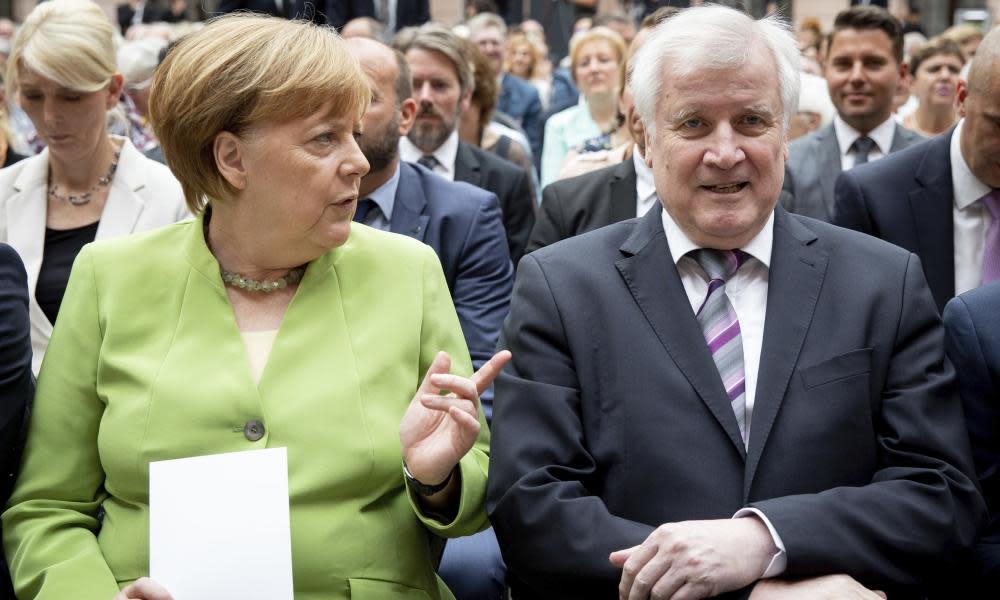Mini-summit on migration unlikely to heal European rifts

It will take more than a mini-summit to bridge the profound differences that exist both between and within EU capitals over how to handle asylum and irregular migration.
Indeed, no sooner had the European commission announced the informal meeting, to be attended by Germany, France, Italy, Greece, Spain, Malta, Bulgaria, Belgium and the Netherlands, than the recriminations began.
Aimed at throwing a political lifeline to Angela Merkel in a fraught standoff between the German chancellor and her hardline interior minister, Horst Seehofer, that threatens the stability of her coalition, the measures the summit will discuss have infuriated Italy.
And while Poland, Hungary and the Czech Republic will not be present in Brussels on Sunday, their refusal to accept any obligatory quota or redistribution arrangements will necessarily weigh on whatever conclusions it is able to reach.
The fault lines in Europe’s latest political crisis are not just national, but ideological. The commission, Merkel, the French president, Emmanuel Macron, and the new Spanish prime minister, Pedro Sánchez, continue to seek EU-wide agreement and coordinated action.
Rightwingers, including Seehofer, who is demanding the right to turn back refugees and migrants arriving from other EU countries, and the Austrian chancellor, Sebastian Kurz, who has called for an “axis of the willing” to tackle illegal migration, want a radical bi- or trilateral approach.
Far-right nationalists, such as Austria’s vice-chancellor, Heinz-Christian Strache, Italy’s interior minister, Matteo Salvini, who will allow no NGO-run migrant rescue ships to land, and Hungary’s Viktor Orbán, who this week pushed through laws making it a criminal offence to help asylum seekers, are prepared to go their own way.
With differences so deep and the immediate practical concerns of arrival and destination states so diverse, it is hard to see significant progress being made at Sunday’s meeting, which is intended to prepare the ground for a broader debate on migration between all EU leaders at their summer summit on 28 and 29 June.
Unable for the past three years to reform its Dublin regulation, which requires refugees to claim asylum in the first EU country they enter, the EU is focusing on areas where a minimum of common ground could exist, such as beefing up its external borders and cooperating more closely with countries from Turkey to Niger to stop people leaving.
According to a draft joint declaration, the mini-summit will agree to spend more on building the bloc’s border and coastguard into a “genuine border police force” of 10,000 officers by 2020, and setting up controversial “protection and reception capacity” outside the EU to separate refugees seeking asylum from migrants seeking work.
Participants also aim to strengthen internal controls to combat “secondary movement” of asylum seekers to other EU states, and to agree on “new joint readmission procedures” that would make it easier to send asylum seekers who cross borders back to the states where they applied.
Such measures may placate the likes of Seehofer. But the German interior minister will be less enamoured of a warning that “unilateral, uncoordinated measures” – of the kind he is proposing, and Salvini has already taken – risk “severely damaging the process of European integration”.
And Salvini – in principle, Seehofer’s ideological ally – has protested furiously at the very proposals most likely to find favour with the German interior minister, such as fast-track migrant returns, which he fears could turn Italy into Europe’s holding camp for irregular migrants.
“If they’re thinking of sending us more migrants instead of helping us, then we shouldn’t go [to Brussels] at all,” the leader of the far-right League party said on Wednesday.
Salvini continued: Macron and Sánchez “speak of goodness and generosity ... They should prove it.”

 Yahoo News
Yahoo News 
